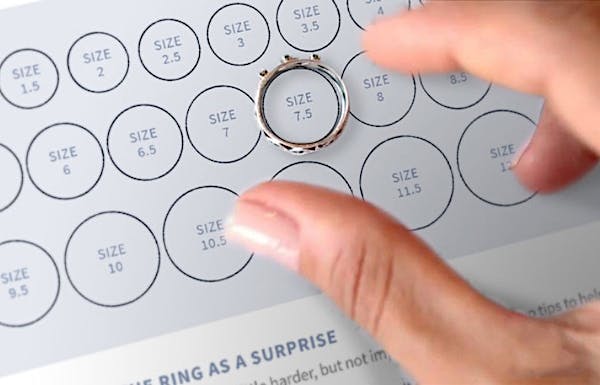Introduction
When it comes to buying a ring, whether it’s for an engagement, a wedding, or just a stylish accessory, getting the right fit is crucial. Nobody wants a ring that’s too loose it slips off or too tight it feels uncomfortable. That’s where a ring size chart becomes your best friend. In this comprehensive guide, we’ll delve into everything you need to know about ring sizes, from understanding how they’re measured to finding your perfect fit.
Understanding Ring Sizes
How ring sizes are measured
Ring sizes vary across different regions, but the most common sizing systems are the US ring sizes, UK ring sizes, and European ring sizes. Each system has its own set of measurements, typically ranging from smaller sizes for delicate fingers to larger sizes for those with larger hands.
Factors affecting ring size
Your ring size can be influenced various factors such as temperature, humidity, and even the time of day. It’s essential to consider these factors when determining your ring size to ensure the perfect fit.
Finding Your Ring Size
Determining your ring size doesn’t have to be a daunting task. There are several methods you can use to measure your ring size accurately.
Methods to measure ring size at home
You can measure your ring size at home using simple tools like a ring sizer, a printable ring size chart, or even the string or paper method. These methods are convenient and can provide reasonably accurate results.
Getting professionally measured
For a more precise measurement, consider visiting a jeweler to have your ring size professionally measured. Jewelers have specialized tools and expertise to ensure an accurate fit.
Tips for accurate measurement
Whether you’re measuring your ring size at home or getting professionally measured, there are a few tips to keep in mind. Make sure to measure your finger at the end of the day when it’s likely to be slightly larger, and avoid measuring when your hands are cold, as this can cause them to shrink.
Using a Ring Size Chart
Once you’ve determined your ring size, lab made diamonds, the next step is to understand how to use a ring size chart effectively.
How to read a ring size chart
A ring size chart typically consists of a series of numbers or letters corresponding to different ring sizes. To find your size, locate your measurement on the chart and match it with the corresponding size.
Interpreting different sizing systems
It’s essential to note that different regions use different sizing systems, so be sure to familiarize yourself with the system used in your area when referring to a ring size chart.
Adjusting for comfort and style
Keep in mind that comfort and style preferences may vary when it comes to ring fit. Some people prefer a snug fit, while others prefer a looser fit for added comfort. Consider these factors when using a ring size chart to find your perfect fit.
Popular Ring Size Charts
There are several ring size charts available, each with its own set of measurements and variations. It’s essential to compare different charts to find the one that best suits your needs.
Comparison of different charts
From standard sizing charts to specialized charts for specific ring types, there’s no shortage of options when it comes to ring size charts. Take the time to explore different charts to find the one that works best for you.
Online resources for ring sizing
In addition to physical ring size charts, many online resources offer virtual ring sizing tools and guides to help you find your perfect fit from the comfort of your own home.
Ring Size Conversion
If you’re purchasing a ring from a different region or using a chart with a different sizing system, you may need to convert your ring size.
Converting between different sizing systems
Converting between different sizing systems is relatively straightforward with the help of conversion charts and online calculators. Be sure to double-check your conversions to ensure accuracy.
Tools and calculators for conversion
There are several tools and calculators available online to assist with ring size conversion, making it easy to find the equivalent size in your preferred system.
Common Mistakes When Determining Ring Size
Despite your best efforts, it’s easy to make mistakes when determining your ring size. Here are some common pitfalls to avoid:
Oversized or undersized rings
Ordering a ring that’s too big or too small is a common mistake that can easily be avoided taking accurate measurements.
Impact of temperature and time of day
Remember that factors like temperature and time of day can affect your finger size, so be sure to measure under consistent conditions.
Overlooking style and design considerations
In addition to size, consider the style and design of the ring when making your selection. Some designs may fit differently than others, so it’s essential to try on different styles to find the perfect fit.
Adjusting Ring Size
If you find that your ring doesn’t fit quite right, don’t worry! There are several options for adjusting the size of your ring to ensure a comfortable fit.
Resizing options for rings
Most rings can be resized a professional jeweler, who can either enlarge or reduce the size to fit your finger perfectly.
DIY methods for resizing at home
In some cases, you may be able to resize your ring at home using simple tools and techniques. However, it’s essential to exercise caution to avoid damaging the ring.



